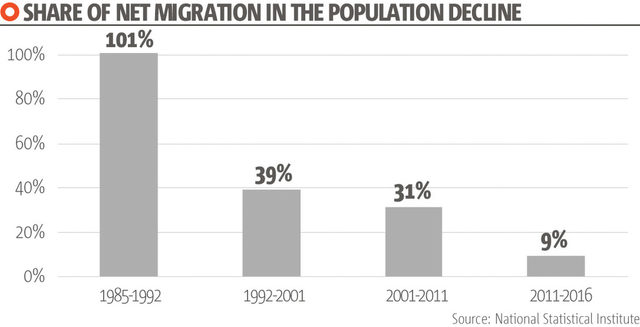• About 1.1 million people born in Bulgaria are living abroad. O them, 600,000 to 700,000 left the country for economic reasons and reside mainly in the EU, Turkey, and the USA.
• Bulgaria's EU membership provided visa-free travel to about 150 countries in the world and free access to the employment markets of the EU. Nonetheless, annual emigration did not rise after the country joined the EU.
• Аbout 35,000 Bulgarian citizens returned to the country over the last four years, but more Bulgarians still move out of the country each year than return to it.
Bulgarians are now so accustomed to free travel and access to European labor market that they often forget they only recently acquired them. It was only in 2007, with the accession of Bulgaria to the EU, that Bulgarians began to enjoy the same freedoms of travel as citizens of other EU member states. Seven years into Bulgaria's EU membership, its citizens received full access to the EU's labor markets.
However, statistical data shows that, instead of spurring emigration, freedom of movement has had the opposite effect. Though the emigration trend has not yet been reversed, now fewer Bulgarians now emigrate and more of them return to Bulgaria after spending time abroad.
A 1.85 million population decline over 30 years
A decline in population can be traced in censuses performed in Bulgaria in 1985, 1992, 2001, and 2011, as well as in the most recent annual Assessment of the National Statistical Institute (NSI) comprising data as of end-2016.
Bulgaria's population decreased by over 461,000 people from 1985 to 1992, a drop of 5.2% due entirely to emigration. The main factor was the compelled exodus of Bulgarians of Turkish ethnicity and Muslim religion during the second half of the 1980s, under pressure of the Communist regime. UN data indicates that 462,767 people born in Bulgaria lived in Turkey as of 1990.
The 2001 census showed a further decline of 554,333 people, a drop of 6.5%, in comparison to 1992. The 2011 census registered a population 564,000 people fewer than in 2001, a drop of 7.2%.
Overall, Bulgaria's population has shrunk by 1.85 million people during the period 1985 - 2016. According to the NSI, over 52% of this decrease is due to negative natural growth rate (i.e. the difference between birth rate and mortality rate); 48% is attributed to negative net migration (i.e. the difference between immigration into and emigration out of the country). Nearly half of the negative net migration figure is due to the expulsion of ethnic-Turkish and Muslim citizens three decades ago. While the population drop between 1985 and 1992 was due to negative net migration, population decline in subsequent years is attributed to negative natural growth.
Ironically, emigration from Bulgaria had peaked when there were visa restrictions. Until the 1990s, Bulgarians were required exit visas to leave the country, and for quite some time thereafter the country had a visa regime with almost all Western states. It was not until April ,2001 that Bulgarian citizens were granted the right to travel freely within the EU borderless Schengen area. Restrictive visa regimes for the UK and Ireland were retained until January 1, 2007, when Bulgaria joined the EU. Seven years later, Bulgarians received full access to the EU's labor market. Restrictions are still in place, however, in a number of countries outside of the EU to which Bulgarian citizens have migrated, including the USA and Australia. Canada will grant Bulgarians and Romanians the right for visa-free short-term visits in December 2017.
Negative net migration decreased over the past decade as Bulgaria's visa free regimes with more than 150 countries and freedom of movement, work and residence within the EU provided for better employment options for Bulgarian citizens.
Bulgarians living abroad: how many and where?
Estimates of the number of Bulgarian citizens living abroad vary. Censuses conducted in Bulgaria and in countries Bulgarian nationals have tended to migrate to provide relatively accurate data. The most recent censuses in the EU and Turkey were held in 2011. In other receiving countries, censuses have taken place in different years or, in this analysis have been substituted for by other regular surveys.
The first approach taken in the present estimate of the numbers of Bulgarian citizens living abroad is to use Bulgarian census data from which the number of people who have moved out of the country will be derived. According to Bulgarian national statistics, about 900,000 people have left Bulgaria in the last 30 years, with about half of them being Bulgarian ethnic Turks who left in the late 1980s).
The second approach used in the present study was to use census data from the receiving countries, as most such surveys include questions as to place of birth.
2011 census data from receiving countries indicate that about one million Bulgarian-born people were living abroad at the time. Mostly in other EU member states and countries of the European Economic Area (EEA). About 500,000 people born in Bulgaria lived in Spain, Greece, Germany, Great Britain, and Italy. Just over 400,000 resided in Turkey and just under 100,000 in North America.
Recent Eurostat data for twenty-two countries of the EU and the EEA indicates that, as of early 2016, the number of Bulgarian-born people living therein has risen by 87,000 in comparison with 2011. Thus, the number of Bulgarian-born people living in other EU member states has reached 600,000, taking the total number of those living abroad to slightly above 1.1 million.
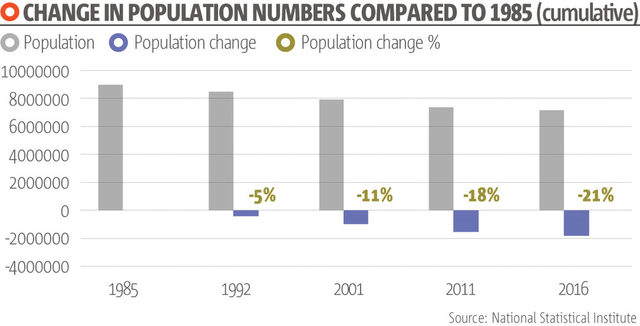
In addition to census data based on country of birth, Eurostat also publishes population numbers according to citizenship. Data available for thirty-one EU and EEA. countries shows that 719,000 Bulgarian citizens reside therein as of 2016, with the largest numbers in Germany, Spain, Greece, the UK and Italy. It should be noted that not all those Bulgarian passport holders were born in Bulgaria, some are members of long-term ethnic-Bulgarian communities in Moldova, the former Yugoslavia, and Ukraine who received Bulgarian citizenship and use it to gain access to work in other EU countries. In addition, children born abroad of Bulgarian citizens can hold Bulgarian citizenship but are not counted as emigrants. For these reasons Eurostat data on the Bulgarian citizens living in the EU may provided an overestimate of the the numbers of Bulgarians who have moved out of the country.
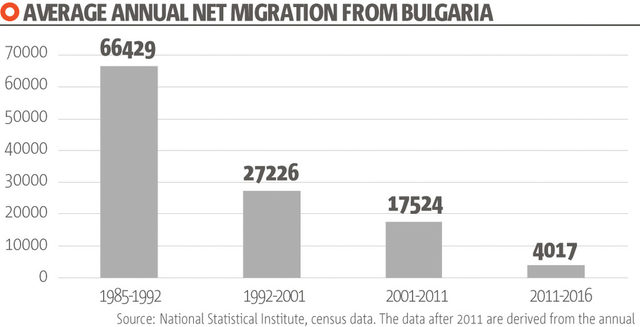
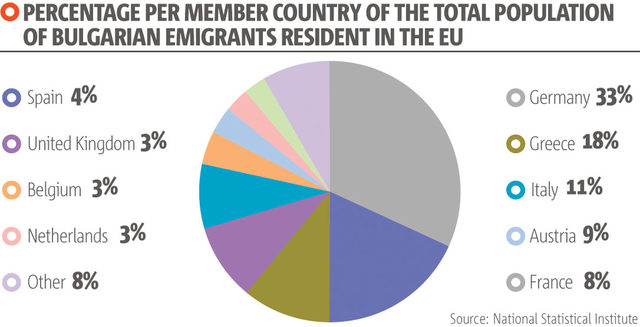
Although the results vary from source to source, in part due to different timeframes and definitions of migration as well as inaccuracies, a consensus figure can emerge that approximately 1.1 million Bulgarian citizens have left the country since mid 1980s. They live mainly in the EU, Turkey and the US and, according to our estimate, between 600,000 and 700,000 people have moved out for economic reasons.
Is the tide turning?
Interesting changes in migration patterns have occurred in Bulgaria in the last five years. On the one hand, the number of those leaving remained high - on average about 25,000 annually. On the other hand, the number of Bulgarians returning to the country gradually increased to an average of approximately 21,000 people annually. Thus, negative net migration was about 4,000 people per year , far below average levels for the last three decades. According to NSI data, there have been substantial variations in the net emigration figures,from a range of 1,000 to 2,000 people between 2012 and 2014, to 9,000 in 2016.
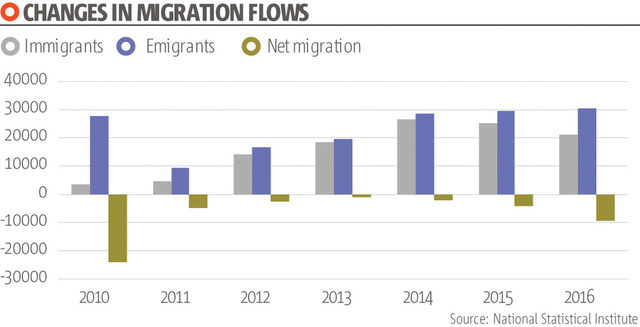
According to Bulgarian national statistics, 21,241 people changed their place of residence from abroad to Bulgaria last year. Out of them, 46% were born in Bulgaria, 9% were born in other EU countries, and the rest primarily Turkey, Russia, and Ukraine.
In each of the past three years, about 10,000 Bulgarian migrants have been returning to Bulgaria - twice as many compared to 2013, when the number of returnees was 4,771. The inbound flow is still lower compared to outbound migration but shows a process of reversal of migration trends in Bulgaria.
The rate of return could increase if there is high economic growth, increased employment opportunities, and decreases in the differences in incomes and living standards between Bulgaria and the countries of Western Europe. Similar trends have emerged in new EU member states such as Estonia, where net return migration was positive in 2016 for a second year in a row, i.e. more people were settling in the country than leaving it.

Georgi Angelov is a senior economist and Marin Lessenski is a European policies program director with the Open Society Institute - Sofia
• About 1.1 million people born in Bulgaria are living abroad. O them, 600,000 to 700,000 left the country for economic reasons and reside mainly in the EU, Turkey, and the USA.
• Bulgaria's EU membership provided visa-free travel to about 150 countries in the world and free access to the employment markets of the EU. Nonetheless, annual emigration did not rise after the country joined the EU.
• Аbout 35,000 Bulgarian citizens returned to the country over the last four years, but more Bulgarians still move out of the country each year than return to it.









